
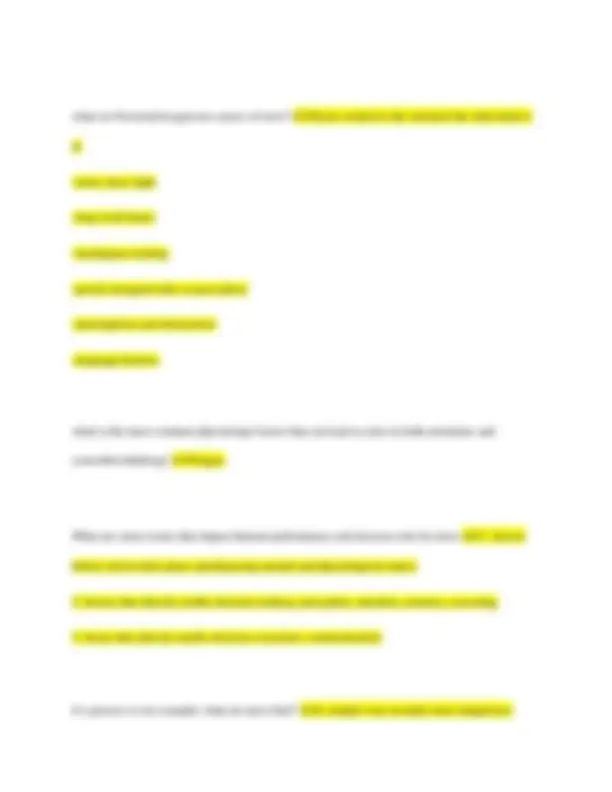
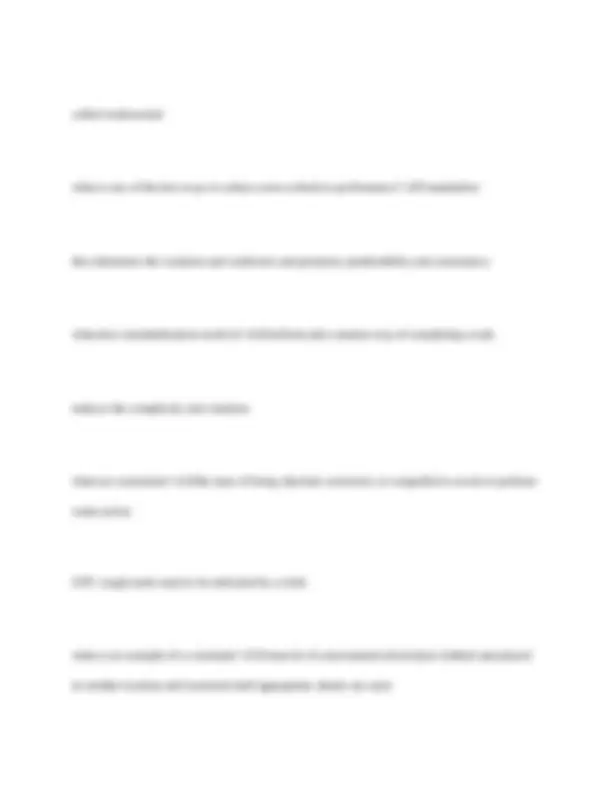
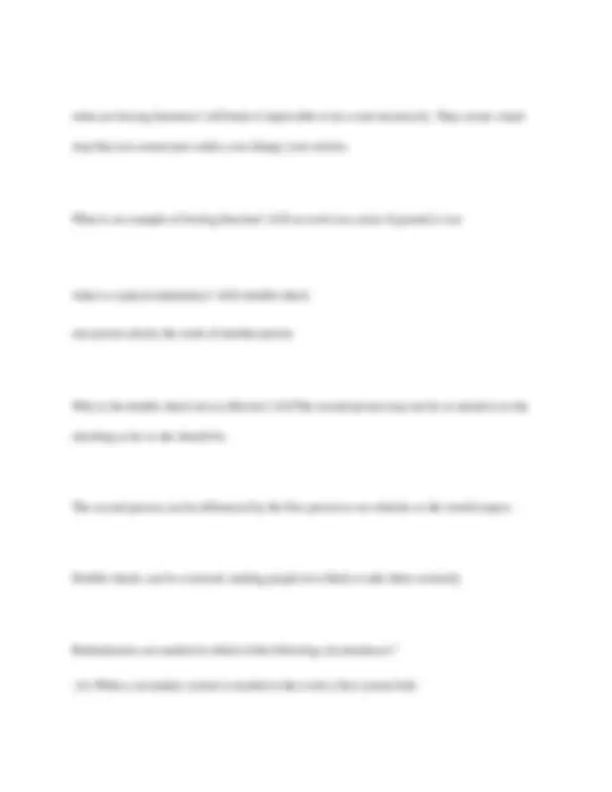
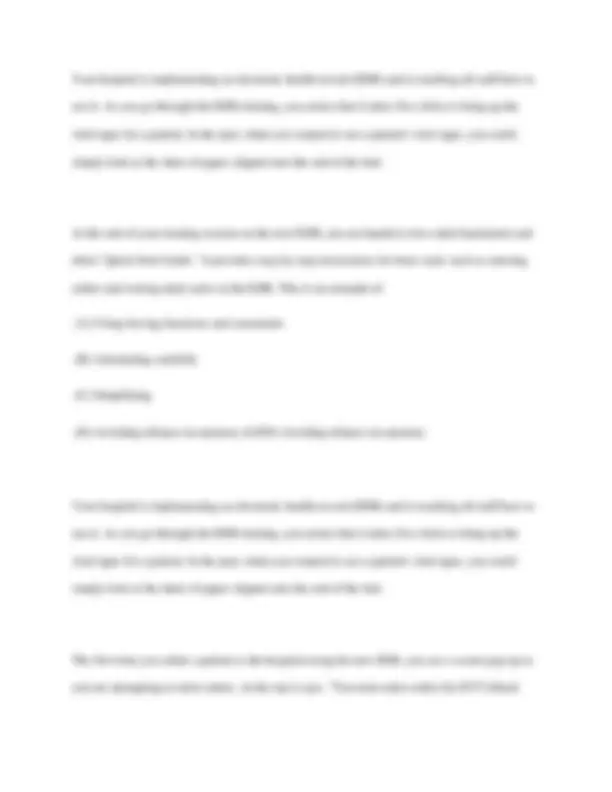
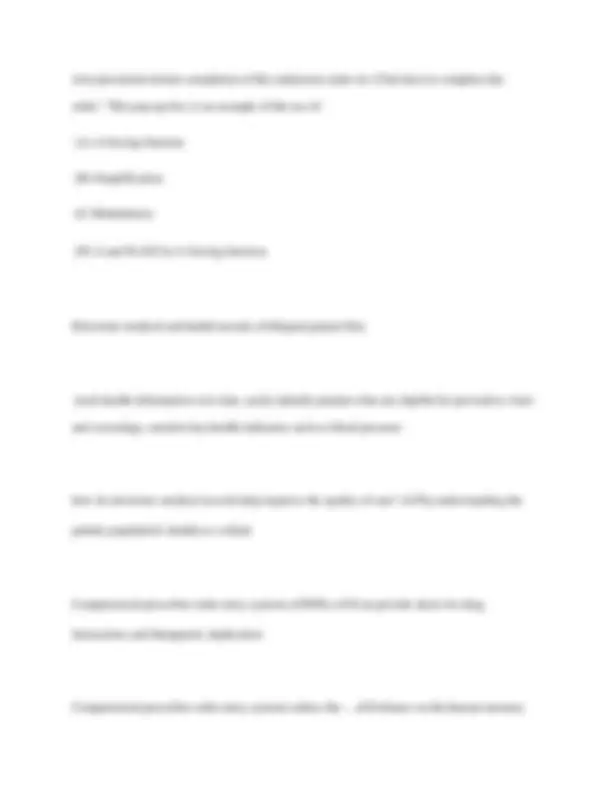
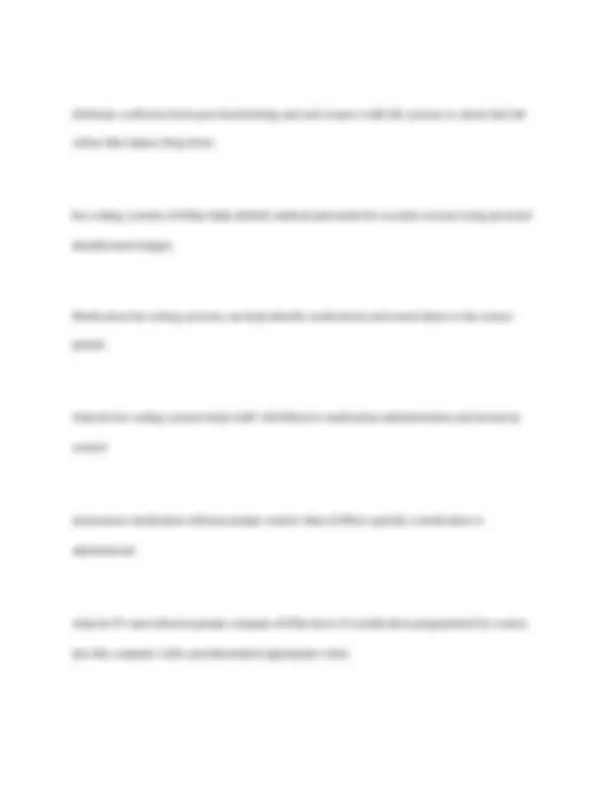
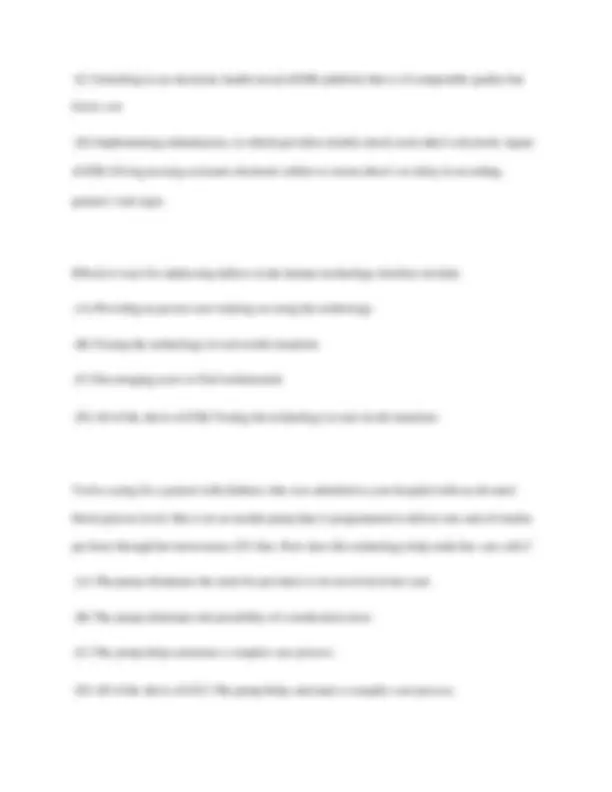
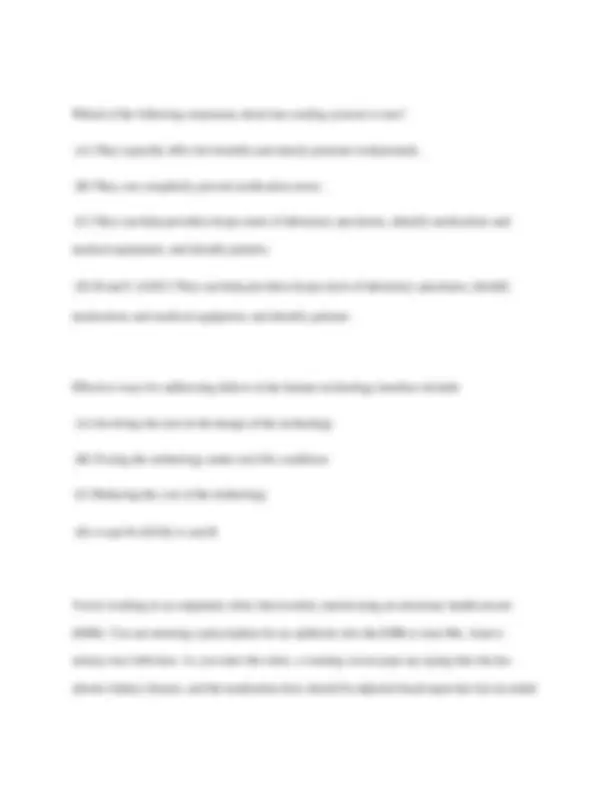
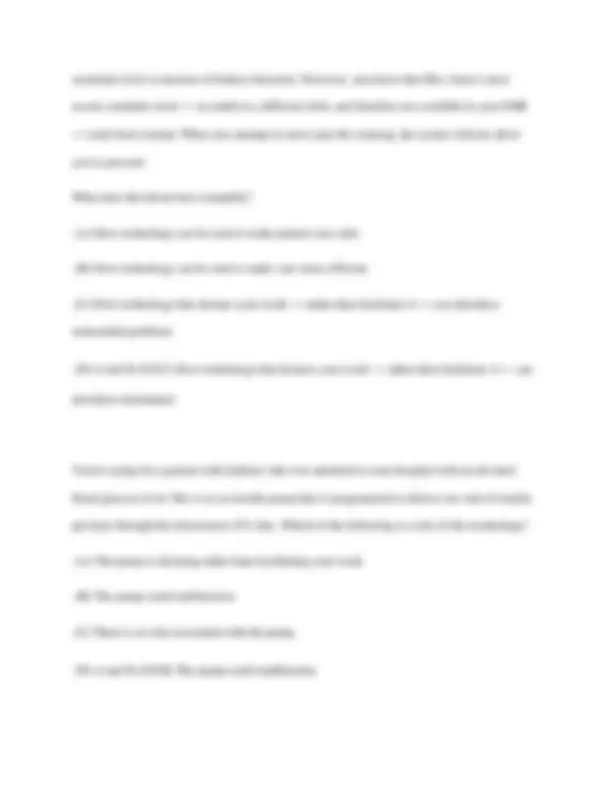


Study with the several resources on Docsity

Earn points by helping other students or get them with a premium plan


Prepare for your exams
Study with the several resources on Docsity

Earn points to download
Earn points by helping other students or get them with a premium plan
Community
Ask the community for help and clear up your study doubts
Discover the best universities in your country according to Docsity users
Free resources
Download our free guides on studying techniques, anxiety management strategies, and thesis advice from Docsity tutors
A collection of questions and answers related to human factors and safety in healthcare. It covers topics such as automatic and controlled thinking, cognitive dispositions to respond, endogenous and exogenous causes of error, and strategies for minimizing the opportunity for error. The document also explores the use of technology in healthcare, including electronic health records (ehrs), computerized prescriber order entry systems (cpoes), and bar coding systems.
Typology: Exams
1 / 16

This page cannot be seen from the preview
Don't miss anything!










How is our mental function defined as ✔✔automatic thinking
rapid and effortless
what is an error of execution? ✔✔if your gas tank is on the right but your friends is on the left
if you pull up to the pump with the tank on the right
What is controlled thinking ✔✔consciously solve problems and make decisions
sometimes this can be a slow process involving a great deal of effort.
what type of thinking leads to errors of planing ✔✔controlled thinking
What are mental short cuts your brain uses during controlled and automatic thinking called?
✔✔heuristics
What do heuristics lead to? ✔✔incorrect actions and poor decision making
What is Cognitive dispositions to respond? ✔✔predictable ways that humans misjudge situations
What categories are cognitive dispositions to respond in the medical field? ✔✔1. faulty
assessment of probability
overestimating the likelihood of something
What are endogenous/ internal causes? ✔✔factors related to the individual
physiological states that cloud our judgement and though processes
called workaround
what is one of the best ways to reduce errors related to performance? ✔✔standardize
this eliminates the variation and confusion and promotes predictability and consistency
what does standardization result in? ✔✔uniform and common way of completing a task
reduces the complexity and variation
what are constraints? ✔✔the state of being checked, restricted, or compelled to avoid or perform
some action
OTC cough meds need to be unlocked by a clerk
what is an example of a constraint? ✔✔removal of concentrated electrolytes (lethal) and placed
in another location and restricted until appropriate checks are used
what are forcing functions? ✔✔make it impossible to do a task incorrectly. They create a hard
stop that you cannot pass unless you change your actions.
What is an example of forcing function? ✔✔car won't use cruise if ground is wet
what is a typical redundancy? ✔✔a double check
one person checks the work of another person
Why is the double check not as effective? ✔✔The second person may not be as attentive to the
checking as he or she should be.
The second person can be influenced by the first person to see what he or she would expect.
Double checks can be overused, making people less likely to take them seriously.
Redundancies are needed in which of the following circumstances?
(A) When a secondary system is needed in the event a first system fails
Which of the following statements about redundancies within processes is always true?
(A) They are needlessly inefficient. (B) They remove the opportunity for error. (C) They require two people to do the work of one. (D) None of the above ✔✔(D) None of the above
Your hospital is implementing an electronic health record (EHR) and is teaching all staff how to use it. As you go through the EHR training, you notice that it takes five clicks to bring up the vital signs for a patient. In the past, when you wanted to see a patient's vital signs, you could simply look at the sheet of paper clipped onto the end of the bed.
Which of the following likely needs to be improved about the new process to review vital signs?
(A) It needs to be simplified. (B) It needs to be standardized. (C) It needs redundancies added. (D) It needs to avoid reliance on memory. ✔✔(A) It needs to be simplified.
Your hospital is implementing an electronic health record (EHR) and is teaching all staff how to use it. As you go through the EHR training, you notice that it takes five clicks to bring up the vital signs for a patient. In the past, when you wanted to see a patient's vital signs, you could simply look at the sheet of paper clipped onto the end of the bed.
At the end of your training session on the new EHR, you are handed a two-sided laminated card titled "Quick Start Guide." It provides step-by-step instructions for basic tasks such as entering orders and writing daily notes in the EHR. This is an example of:
(A) Using forcing functions and constraints (B) Automating carefully (C) Simplifying (D) Avoiding reliance on memory ✔✔(D) Avoiding reliance on memory
Your hospital is implementing an electronic health record (EHR) and is teaching all staff how to use it. As you go through the EHR training, you notice that it takes five clicks to bring up the vital signs for a patient. In the past, when you wanted to see a patient's vital signs, you could simply look at the sheet of paper clipped onto the end of the bed.
The first time you admit a patient to the hospital using the new EHR, you see a screen pop up as you are attempting to enter orders. At the top it says, "You must enter orders for DVT (blood
eliminate confusion from poor handwriting and and connect with lab systems to check that lab values that impact drug doses
bar coding systems ✔✔they help identify medical personnel for security reasons using personal
identification badges.
Medication bar-coding systems can help identify medications and match them to the correct patient.
what do bar coding systems help with? ✔✔effective medication administration and inventory
control
intravenous medication infusion pumps control what ✔✔how quickly a medication is
administered.
what do IV med infusion pumps compare ✔✔the dose of a medication programmed by a nurse
into the computer with a predetermined appropriate value.
If the programmed dose exceeds the limit of the predetermined value, the computer will alert the user.
what doe pharmacy computer systems do? ✔✔help track medication doses and inventory,
number of clinical interaction features
-therapeutic duplication checks
-dose checks
You're working in an outpatient clinic that recently started using an electronic health record (EHR). You are entering a prescription for an antibiotic into the EHR to treat Mrs. Jones's urinary tract infection. As you enter the order, a warning screen pops up saying that she has chronic kidney disease, and the medication dose should be adjusted based upon her last recorded creatinine level (a measure of kidney function). However, you know that Mrs. Jones's most recent creatinine level — recorded at a different clinic and therefore not available in your EHR — came back normal. When you attempt to move past the warning, the system will not allow you to proceed.
Which of the following concepts does this scenario demonstrate?
(C) Switching to an electronic health record (EHR) platform that is of comparable quality but lower cost
(D) Implementing redundancies, in which providers double-check each other's electronic inputs
✔✔(B) Giving nursing assistants electronic tablets to ensure there's no delay in recording
patients' vital signs
Effective ways for addressing defects in the human-technology interface include:
(A) Providing in-person user training on using the technology (B) Testing the technology in real-world situations (C) Encouraging users to find workarounds (D) All of the above ✔✔(B) Testing the technology in real-world situations
You're caring for a patient with diabetes who was admitted to your hospital with an elevated blood glucose level. She is on an insulin pump that is programmed to deliver one unit of insulin per hour through her intravenous (IV) line. How does this technology help make her care safer?
(A) The pump eliminates the need for providers to be involved in her care. (B) The pump eliminates the possibility of a medication error. (C) The pump helps automate a complex care process. (D) All of the above ✔✔(C) The pump helps automate a complex care process.
Which of the following statements about bar-cording systems is true?
(A) They typically offer few benefits and merely promote workarounds. (B) They can completely prevent medication errors. (C) They can help providers keeps track of laboratory specimens, identify medications and medical equipment, and identify patients.
(D) B and C ✔✔(C) They can help providers keeps track of laboratory specimens, identify
medications and medical equipment, and identify patients.
Effective ways for addressing defects in the human-technology interface include:
(A) Involving the user in the design of the technology (B) Testing the technology under real-life conditions (C) Reducing the cost of the technology (D) A and B ✔✔(D) A and B
You're working in an outpatient clinic that recently started using an electronic health record (EHR). You are entering a prescription for an antibiotic into the EHR to treat Mrs. Jones's urinary tract infection. As you enter the order, a warning screen pops up saying that she has chronic kidney disease, and the medication dose should be adjusted based upon her last recorded
Which of the following is the best example of using technology to improve safety and prevent errors?
(A) Switching to an electronic health record (EHR) platform that is of comparable quality but lower cost
(B) Implementing redundancies, in which providers double-check each other's electronic inputs (C) Providing inpatients with electronic tablets so that they can keep in better touch with the outside world
(D) Giving nursing assistants electronic tablets to ensure there's no delay in recording patients'
vital signs ✔✔(D) Giving nursing assistants electronic tablets to ensure there's no delay in
recording patients' vital signs